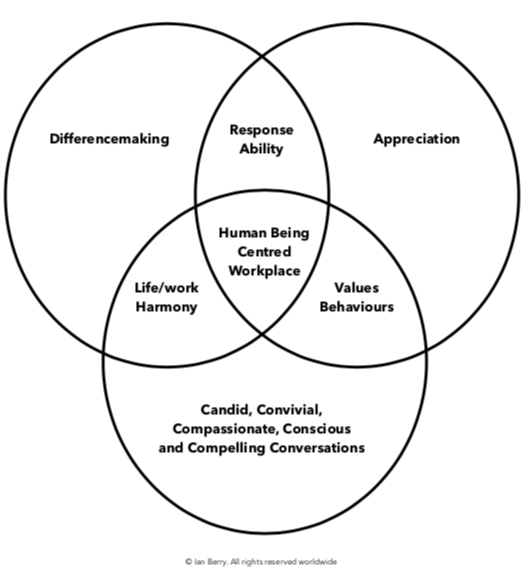I'm not certain that the workplace has ever truly been human being centred. What is growing in certainty for me is that our best and brightest future has much to do with human being centred workplaces.
Here's a 3 minutes and 22 seconds video where I share what I feel are the six essential components:
I expand on each below:
Differencemaking
For me differencemaking is a good way to describe our reason for being.
What difference does your life and work make in the lives of other people?
Diversity, equity, inclusion, and belonging (often referred to as DEIB) are four ways to ensure that who we are and what we do matters.
Differencemaking is our why, intent, reason for being.
In my case I help business leaders to co-create human being centred workplaces because doing so helps to solve the problem that the number of employees bringing their best to their work are still in the minority.
How could you be and do more as a differencemaker?
Response Ability
Response Ability is your ability and willingness to make the wisest choices for your own and other people's well-being in the moment, as well as in the short and long term.
I've been writing about the nine future ready skills of Response Ability in my weekly newsletter on LinkedIn. The nine are Heartful Disposition, Behaving in alignment with your essence, Being in service to others, Possibility focused, Open to input, Doing work that is meaningful for you and highly valuable for others, Farsight, Connection and Belonging, Feeling valued. You can access the articles here.
Appreciation
Do you feel appreciated in your workplace? In your personal life?
Who are you and what do you do that enables other people to feel appreciated?
In most workplaces there’s a lack of appreciation going on despite a known fact best described by the eminent psychologist William James who said:
"The deepest principle in human nature is the craving to be appreciated."
One action you can take right now that enacts this deepest principle
Reflect on the people closest to you at home, at work, and the other places you go.
Write down these people’s names and one way you could show genuine appreciation to them in the next fortnight without any cost except that of your time and energy.
Go show appreciation without attachment to getting back.
Make this ritual part of your everyday life.
Below is part of a conversation I had with a client who had temporarily lost her bearings regarding her core appreciation of herself, after a heated discussion with her boss.
I asked her “Outside of the workplace where do you feel most appreciated?”
Straight away she replied “My eldest son is brilliant at showing appreciation to me, and often it’s just little things that surprise and delight me.”
“What little things could you do to surprise and delight your boss?" I asked.
What followed was a candid and convivial conversation that revealed my client had rarely, if ever, shown appreciation to her boss. I explained to my client that often we don’t receive what we most need ourselves unless we’re giving it to others without attachment to getting back. I also said “It’s OK to ask for help!”
Values Behaviours
In the very best teams and organisations values are not just words they are agreed behaviours.
Values must be agreed behaviours otherwise they are just meaningless words.
Over the course of a three year project with one client, I helped them through collaboration with one another, to turn values (single words) into virtues ("behaviours showing high moral standards").
In the case of this client eighteen behaviours were the result of significant work. We subsequently learned that eighteen is too many and that three to five is good practice.
As behaviours became the focus, or as one of the leaders involved described it "As soon as living our values became our intention, and the key focus of our attention, performance dramatically improved."
I was astounded by the performance improvement and observed two other deep factors at play.
1) The more values were lived, the more people felt valued, and the greater value they exchanged and delivered to other people.
2) I also learned that sustaining a high level of people feeling valued, living values, and exchanging and delivering value, depended greatly on leadership (people), management (process), and culture (who we are and how we behave around here).
Life/work harmony
I believe life/work balance is nonsense. Life/work harmony is possible.
The word balance for me implies equal. I prefer the word harmony, therefore life/work harmony.
My personal and business life are not equal or in balance and are never likely to be.
They are in harmony with one another, that is, they work together like a symphony, two sides of the same coin
For me there are eleven principles for ensuring life/work harmony. You can read about them here.
Become the wise leader you want to be.
Ian


No comments:
Post a Comment